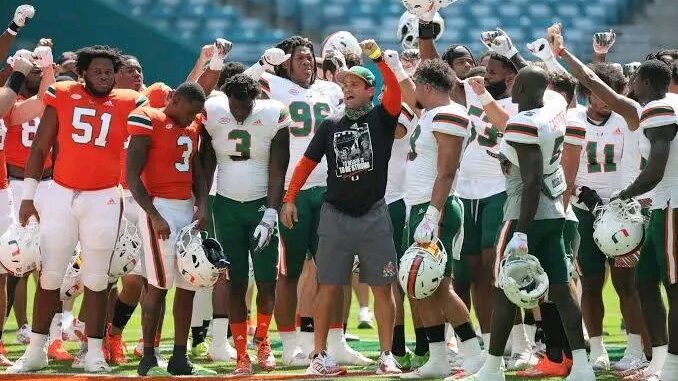
Sure! Here’s a 900-word article about the 2001 Miami Hurricanes and the new Netflix documentary:
—
Netflix Chronicles the Dominance of the 2001 Miami Hurricanes in New Documentary
It’s official: Netflix has released a new documentary chronicling the legendary 2001 season of the Miami Hurricanes football team—a year widely considered the pinnacle of the program’s illustrious history. Titled “The U: Perfect Storm,” the documentary delves into the remarkable journey of one of the most dominant college football teams ever assembled, spotlighting the unique blend of talent, swagger, and discipline that defined Miami’s 2001 campaign.
The 2001 Hurricanes were more than just a great team; they were a phenomenon. Led by head coach Larry Coker in his first season at the helm and the cool, cerebral quarterback Ken Dorsey, Miami finished the season a perfect 12-0. But numbers alone don’t do justice to the sheer dominance they exhibited. The Hurricanes steamrolled opponents with an average margin of victory of nearly 33 points, holding all but one team to 14 points or fewer and ending the year with a resounding 37-14 victory over Nebraska in the Rose Bowl to claim the national championship.
At the center of the documentary is the story of Ken Dorsey, whose leadership and poise were crucial to the team’s success. Although not the flashiest player on a roster stacked with future NFL stars, Dorsey’s ability to read defenses, deliver in big moments, and maintain composure under pressure made him the perfect general for a high-octane offense. His connection with wide receivers Andre Johnson and tight end Jeremy Shockey was lethal, and his command of the offense allowed the Hurricanes to dictate games on their terms.
But what truly sets the 2001 Hurricanes apart—both in the documentary and in historical memory—is the jaw-dropping level of talent spread across the roster. The team boasted an astonishing 38 future NFL draft picks, including 17 first-rounders. On offense, the backfield featured Clinton Portis, Willis McGahee, and Frank Gore—three elite running backs who each went on to have standout NFL careers. The offensive line was anchored by Bryant McKinnie, a consensus All-American and Outland Trophy winner.
Defensively, the Hurricanes were equally imposing. Safety Ed Reed, one of the team’s vocal leaders and a future Pro Football Hall of Famer, brought a mix of intelligence, intensity, and playmaking ability that became emblematic of the unit as a whole. The linebacking corps, including Jonathan Vilma and D.J. Williams, played with sideline-to-sideline speed and ferocity. And the defensive line, featuring Jerome McDougle and William Joseph, was a nightmare for opposing quarterbacks.
The Netflix documentary offers never-before-seen footage and intimate interviews with former players, coaches, and analysts who witnessed the 2001 season unfold. Viewers are treated to locker room moments, sideline audio, and reflections that peel back the curtain on a team that often seemed too good to be true. For fans of college football, it’s a nostalgic deep dive into an era when swagger and substance were perfectly aligned.
The film doesn’t shy away from the cultural impact of the team, either. The Hurricanes were known not just for winning but for how they won—with a brash confidence that challenged conventional notions of sportsmanship. Critics at the time labeled them arrogant, but fans saw them as authentic. The documentary explores how this attitude was rooted in the team’s identity—many players came from tough backgrounds and used football as a vehicle to change their lives. Their confidence wasn’t showboating; it was survival.
One of the documentary’s most poignant elements is its exploration of the legacy left behind by the 2001 team. That year didn’t just earn them a national title; it cemented Miami as a breeding ground for elite football talent and raised the bar for what dominance in college football looks like. Analysts today still point to that team as the benchmark against which all great squads are measured.
Notably, the documentary also touches on the controversies that have surrounded the Miami program over the years, providing important context about the challenges of maintaining success at the collegiate level. The rise and fall of the program in the years after 2001 are presented not to tarnish the team’s legacy, but to underscore just how rare and special that season truly was.
Former players speak candidly about the pressure they felt during the season, the bond they shared as teammates, and how the experience shaped their lives both on and off the field. Ken Dorsey reflects on his leadership style, emphasizing preparation and composure, while Ed Reed talks about the accountability and brotherhood that made the defense so tight-knit.
In an era of NIL deals and conference realignments, “The U: Perfect Storm” serves as a reminder of a different college football landscape—one where raw talent, intense competition, and fiery personalities collided in spectacular fashion. It paints a vivid portrait of a team that not only dominated its opponents but also captivated a nation.
For fans of the Hurricanes, the documentary is a celebration of the program’s proudest moment. For others, it’s a fascinating case study in excellence—how to build it, how to harness it, and how fleeting it can be. The 2001 Miami Hurricanes weren’t just champions. They were icons. And now, thanks to Netflix, their story gets the cinematic tribute it deserves.
Let me know if you want a shorter version, a social media caption
, or quotes pulled from the film.
Leave a Reply